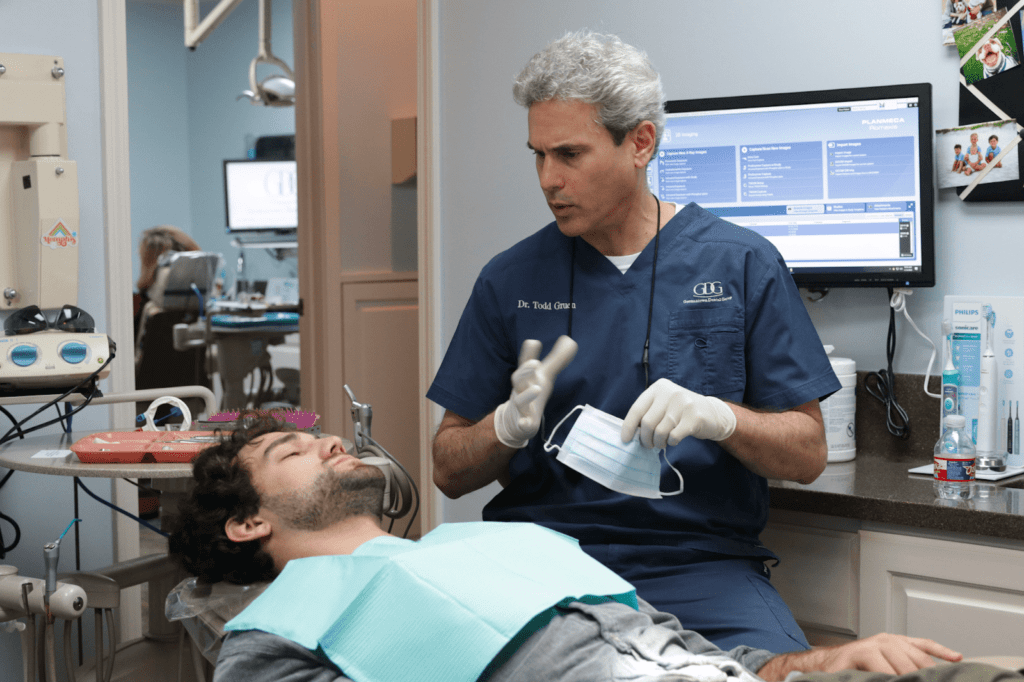Even if you aren’t an expert in the dental field, you likely know that tooth decay is a bad thing. Part of our job is to explain to you how it happens and how to fight it. Today, Germantown Dental Group will answer this question, which is critical to your dental health: What causes tooth decay, and how can I prevent it?
What Exactly is Tooth Decay?
Tooth decay, also known as cavities, is a hugely common oral health issue that occurs when tooth enamel breaks down, usually due to exposure to acid. This is often produced by bacteria found in dental plaque. Erosion of the tooth’s protective outer layer can cause holes to form, which are then treated with fillings.

How it Happens
There are a lot of factors, both internal and external, that can directly cause or encourage tooth decay to happen. Dr. Whittemore and Dr. Gruen will be able to explain your personal risk factors better as you build your patient-provider relationship.
- Poor Oral Hygiene and Habits: Plague can accumulate on tooth surfaces when brushing and flossing are ineffective. If not addressed, plaque produces acidic substances that erode tooth enamel, leading to decay. Neglecting dental care practices such as irregular dental check-ups, failure to use fluoride toothpaste, and infrequent replacement of toothbrushes can exacerbate decay.
- High Sugar or Carbohydrate Diet: Consumption of sugary or carbohydrate-rich foods and beverages, especially between meals, creates an environment for oral bacteria to produce acids that erode tooth enamel.
- Acid Reflux: Gastroesophageal reflux disease (GERD) exposes tooth enamel to stomach acid, a naturally erosive substance, particularly affecting the back of the teeth.
- Acidic Foods or Drinks: Foods and beverages like fruits, sodas, and fruit juices can weaken tooth enamel, making teeth more susceptible to decay.
- Dry Mouth: Saliva is essential for neutralizing mouth acids and remineralizing tooth enamel. Dry mouth, caused by medications, medical conditions, or mouth breathing, reduces saliva production, increasing the risk of tooth decay.
- Enamel Defects: Structural abnormalities or irregularities in tooth enamel, such as enamel hypoplasia or fluorosis, can heighten susceptibility to decay.
- Medical Conditions: Conditions such as acid reflux, eating disorders, or diabetes can elevate the risk of tooth decay by exposing teeth to acid or disrupting saliva production.
- Genetics: Certain individuals may inherit a predisposition to tooth decay, influenced by factors such as enamel thickness or saliva composition.
- Age: Aging can lead to oral health changes, including gum recession and decreased saliva production, potentially increasing the risk of tooth decay.

Fighting Back Against Tooth Decay
The good news is that there are plenty of preventative measures you can integrate into your oral health routine that can keep decay in check.
- Brush Twice a Day: Ensure thorough brushing of your teeth with fluoride toothpaste for two minutes twice a day, using a soft-bristled brush. This helps eliminate plaque and food particles from all tooth surfaces.
- Floss Daily: Make flossing between your teeth a daily habit to remove debris and plaque from areas your toothbrush can’t reach, such as between teeth and along the gumline.
- Drink Water: Drink plenty of water throughout the day, especially between meals, to rinse away food particles and neutralize acids in the mouth.
- Fluoride is Key: Incorporate fluoride mouthwash into your oral hygiene routine to strengthen enamel and prevent decay, alongside using fluoride toothpaste.
- Limit Sugar and Acidity: Reduce consumption of sugary and acidic foods and beverages like candy, soda, and certain fruits to minimize enamel erosion and decrease the risk of decay.
- Eat a Balanced Diet: Follow a balanced diet rich in fruits, vegetables, lean proteins, and whole grains while avoiding frequent snacking, especially on sugary or sticky foods that promote plaque formation and decay.
- Chew Sugar-Free Gum: Chew sugar-free gum after meals to stimulate saliva flow, neutralize acids, remineralize enamel, and remove food particles.
- Consider Other Habits: Pay attention to habits like tobacco use, teeth clenching, or grinding, as they can negatively impact dental health.
- Visit Your Dentist Regularly: Schedule regular dental check-ups and professional cleanings every six months, or as your dentist recommends, for early detection and treatment of decay, ensuring optimal oral health.
- Stay Informed: Stay updated on the latest advancements in dental care by staying in touch with our team and seeking information and advice when needed.

A Health-Centered Approach
Collaborating with our team provides you with outstanding resources to help you combat tooth decay. We’re here to assist, whether you’re someone who prides themselves in oral care or feels as if you have room for improvement. Don’t hesitate to give our Germantown office a call.
 Schedule Now
901-754-0540
Schedule Now
901-754-0540
